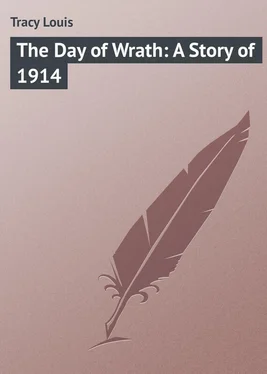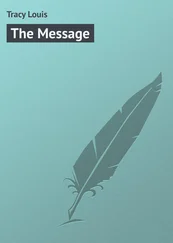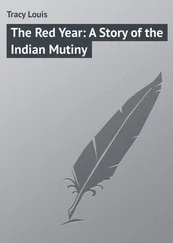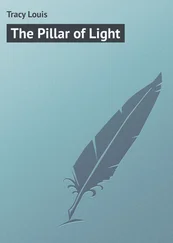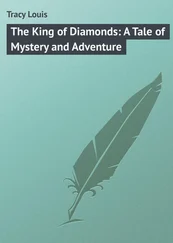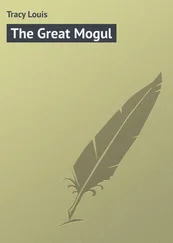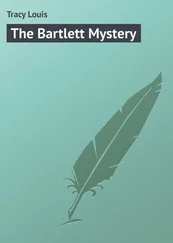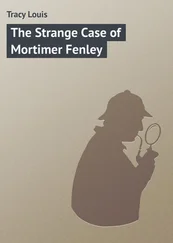Louis Tracy - The Day of Wrath - A Story of 1914
Здесь есть возможность читать онлайн «Louis Tracy - The Day of Wrath - A Story of 1914» — ознакомительный отрывок электронной книги совершенно бесплатно, а после прочтения отрывка купить полную версию. В некоторых случаях можно слушать аудио, скачать через торрент в формате fb2 и присутствует краткое содержание. Жанр: foreign_prose, на английском языке. Описание произведения, (предисловие) а так же отзывы посетителей доступны на портале библиотеки ЛибКат.
- Название:The Day of Wrath: A Story of 1914
- Автор:
- Жанр:
- Год:неизвестен
- ISBN:нет данных
- Рейтинг книги:5 / 5. Голосов: 1
-
Избранное:Добавить в избранное
- Отзывы:
-
Ваша оценка:
- 100
- 1
- 2
- 3
- 4
- 5
The Day of Wrath: A Story of 1914: краткое содержание, описание и аннотация
Предлагаем к чтению аннотацию, описание, краткое содержание или предисловие (зависит от того, что написал сам автор книги «The Day of Wrath: A Story of 1914»). Если вы не нашли необходимую информацию о книге — напишите в комментариях, мы постараемся отыскать её.
The Day of Wrath: A Story of 1914 — читать онлайн ознакомительный отрывок
Ниже представлен текст книги, разбитый по страницам. Система сохранения места последней прочитанной страницы, позволяет с удобством читать онлайн бесплатно книгу «The Day of Wrath: A Story of 1914», без необходимости каждый раз заново искать на чём Вы остановились. Поставьте закладку, и сможете в любой момент перейти на страницу, на которой закончили чтение.
Интервал:
Закладка:
He was interrupted by a choking sob from Madame Joos, who leaned a hand on the table for support. In pose and features she would have served as a model for Hans Memling’s “portrait” of Saint Elizabeth, which in happier days used to adorn the hospital at Bruges. “The Widow Jaquinot,” she gasped.
“Of course, madame, I don’t know the poor creature’s name. I was wondering how to act for the best when two soldiers came to the stable. I heard what they were saying. One of them admitted that he had stabbed the old woman; his words also implied that he and his comrade had violated her granddaughter. So I picked up a milking-stool and killed both of them. I took one of their rifles, which, with its bayonet and a number of cartridges, I hid at the top of the ravine. This is the pail which I found in the shed. No doubt it belongs to the Jaquinot household. Now, I have told you the actual truth. I ask nothing for myself. If I stay here, even though you permit it, my presence will certainly bring ruin on you. So I shall go at once. But I do ask you, as Christian people, to safeguard this young English lady, and, when conditions permit, and she has recovered her strength, to guide her into Holland, unless, that is, these German beasts are attacking the Dutch too.”
For a brief space there was silence. Dalroy looked fixedly at Joos, trying to read Irene Beresford’s fate in those black, glowing eyes. The womenfolk were won already; but well he knew that in this Belgian nook the patriarchal principle that a man is lord and master in his own house would find unquestioned acceptance. He was aware that Irene’s gaze was riveted on him in a strangely magnetic way. It was one thing that he should say calmly, “So I picked up a milking-stool, and killed both of them,” but quite another that Irene should visualise in the light of her rare intelligence the epic force of the tragedy enacted while she lay unconscious in the depths of a hedgerow. Dalroy could tell, Heaven knows how, that her very soul was peering at him. In that tense moment he knew that he was her man for ever. But — surgit amari aliquid ! A wave of bitterness welled up from heart to brain because of the conviction that if he would, indeed, be her true knight he must leave her within the next few seconds. Yet his resolution did not waver. Not once did his glance swerve from Joos’s wizened face.
It was the miller himself who first broke the spell cast on the curiously assorted group by Dalroy’s story. He stretched out a hand and took the pail. “This is fresh milk,” he said, examining the dregs.
“Yes. I milked the cow. The poor animal was in pain, and my friend and I wanted the milk.”
“You milked the cow – before?”
“No. After.”
“Grand Dieu! you’re English, without doubt.”
Joos turned the pail upside down, appraising it critically. “Yes,” he said, “it’s one of Dupont’s. I remember her buying it. She gave him fifty kilos of potatoes for it. She stuck him, he said. Half the potatoes were black. A rare hand at a bargain, the Veuve Jaquinot. And she’s dead you tell me. A bayonet thrust?”
“Two.”
Madame Joos burst into hysterical sobbing. Her husband whisked round on her with that singular alertness of movement which was one of his most marked characteristics.
“Peace, wife!” he snapped. “Isn’t that what we’re all coming to? What matter to Dupont now whether the potatoes were black or sound?”
Dalroy guessed that Dupont was the iron-monger of Visé. He was gaining a glimpse, too, of the indomitable soul of Belgium. Though itching for information, he checked the impulse, because time pressed horribly.
“Well,” he said, “will you do what you can for the lady? The Germans have spared you. You have fed them. They may treat you decently. I’ll make it worth while. I have plenty of money – ”
Irene stood up. “Monsieur,” she said, and her voice was sweet as the song of a robin, “it is idle to speak of saving one without the other. Where Monsieur Dalroy goes I go. If he dies, I die.”
For the first time since entering the mill Dalroy dared to look at her. In the sharp, crisp light of advancing day her blue eyes held a tint of violet. Tear-drops glistened in the long lashes; but she smiled wistfully, as though pleading for forgiveness.
“That is sheer nonsense,” he cried in English, making a miserable failure of the anger he tried to assume. “You ought to be reasonably safe here. By insisting on remaining with me you deliberately sacrifice both our lives. That is, I mean,” he added hastily, aware of a slip, “you prevent me too from taking the chance of escape that offers.”
“If that were so I would not thrust myself on you,” she answered. “But I know the Germans. I know how they mean to wage war. They make no secret of it. They intend to strike terror into every heart at the outset. They are not men, but super-brutes. You saw Von Halwig at Berlin, and again at Aix-la-Chapelle. If a titled Prussian can change his superficial manners – not his nature, which remains invariably bestial – to that extent in a day, before he has even the excuse of actual war, what will the same man become when roused to fury by resistance? But we must not talk English.” She turned to Joos. “Tell us, then, monsieur,” she said, grave and serious as Pallas Athena questioning Perseus, “have not the Prussians already ravaged and destroyed Visé?”
The old man’s face suddenly lost its bronze, and became ivory white. His features grew convulsed. He resembled one of those grotesque masks carved by Japanese artists to simulate a demon. “Curse them!” he shrilled. “Curse them in life and in death – man, woman, and child! What has Belgium done that she should be harried by a pack of wolves? Who can say what wolves will do?”
Joos was aboil with vitriolic passion. There was no knowing how long this tirade might have gone on had not a speckled hen stalked firmly in through the open door with obvious and settled intent to breakfast on crumbs.
“ Ciel! ” cackled the orator. “Not a fowl was fed overnight!”
In real life, as on the stage, comedy and tragedy oft go hand in hand. But the speckled hen deserved a good meal. Her entrance undoubtedly stemmed the floodtide of her owner’s patriotic wrath, and thus enabled the five people in the kitchen to overhear a hoarse cry from the roadway: “Hi, there, dummer Esel ! whither goest thou? This is Joos’s mill.”
“Quick, Léontine!” cried Joos. “To the second loft with them! Sharp, now!”
In this unexpected crisis, Dalroy could neither protest nor refuse to accompany the girl, who led him and Irene up a back stair and through a well-stored granary to a ladder which communicated with a trap-door.
“I’ll bring you some coffee and eggs as soon as I can,” she whispered. “Draw up the ladder, and close the door. It’s not so bad up there. There’s a window, but take care you aren’t seen. Maybe,” she added tremulously, “you are safer than we now.”
Dalroy realised that it was best to obey.
“Courage, mademoiselle!” he said. “God is still in heaven, and all will be well with the world.”
“Please, monsieur, what became of Jan Maertz?” she inquired timidly.
“I’m not quite certain, but I think he fell clear of the wagon. The Germans should not have ill-treated him. The collision was not his fault.”
The girl sobbed, and left them. Probably the gruff Walloon was her lover.
Irene climbed first. Dalroy followed, raised the ladder noiselessly, and lowered the trap. His brow was seamed with foreboding, as, despite his desire to leave his companion in the care of the miller’s household, he had an instinctive feeling that he was acting unwisely. Moreover, like every free man, he preferred to seek the open when in peril. Now he felt himself caged.
Читать дальшеИнтервал:
Закладка:
Похожие книги на «The Day of Wrath: A Story of 1914»
Представляем Вашему вниманию похожие книги на «The Day of Wrath: A Story of 1914» списком для выбора. Мы отобрали схожую по названию и смыслу литературу в надежде предоставить читателям больше вариантов отыскать новые, интересные, ещё непрочитанные произведения.
Обсуждение, отзывы о книге «The Day of Wrath: A Story of 1914» и просто собственные мнения читателей. Оставьте ваши комментарии, напишите, что Вы думаете о произведении, его смысле или главных героях. Укажите что конкретно понравилось, а что нет, и почему Вы так считаете.
